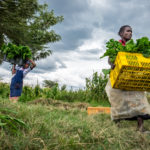On March 24 2020, the Indian government announced a nationwide lockdown to slow the spread of COVID-19. Implemented with just four hours’ notice, the lockdown forced millions of suddenly out-of-work migrants to return to their villages –often by foot over long distances. How can migrant-sending states support labor market opportunities for migrants without compromising COVID…
Information
Leveraging “Big Data” to Improve Labour Market Outcomes
Rapidly expanding internet access has dramatically changed job search behavior across the developing world. This expansion has coincided with the growth of private-sector online job portals that provide search and matching services. Despite these technological advances, labor markets in many low-income countries continue to face high unemployment and persistently low female labor force participation. As…
Taming Counterfeits Markets with Consumer Information
Access to quality inputs is critical for boosting agricultural productivity. However, quantitative research (Tjernström et al., 2017; Bold et al., 2017; Ashour et al., 2019) and news reports (Muchiri, 2019; Okinda, 2019) have documented that the quality of agricultural inputs—such as seeds, fertilizer, and pesticides—is often low in rural African markets. The inability of buyers…
A Tough Call: Understanding the Impact of Mobile Technology on Women’s Work, Gender Gaps, and Social Norms
As digital technology becomes an ever-growing part of economic life in low-income countries, researchers and policymakers face a moment of both opportunity and risk: technologies like smartphones and mobile internet could connect millions of marginalized women and girls to the modern economy, generating new opportunities for employment and human capital accumulation. However, there is a…
The Formal-Informal Labour Nexus and Growth
Although employment in low-income countries (LICs) is strikingly concentrated in the informal sector, the contribution of this sub-economy to the larger economy is not well understood. The traditional view holds that labour markets are segmented; the informal sector provides subsistence income, or a pool of surplus labour for the formal sector, and will likely disappear…




